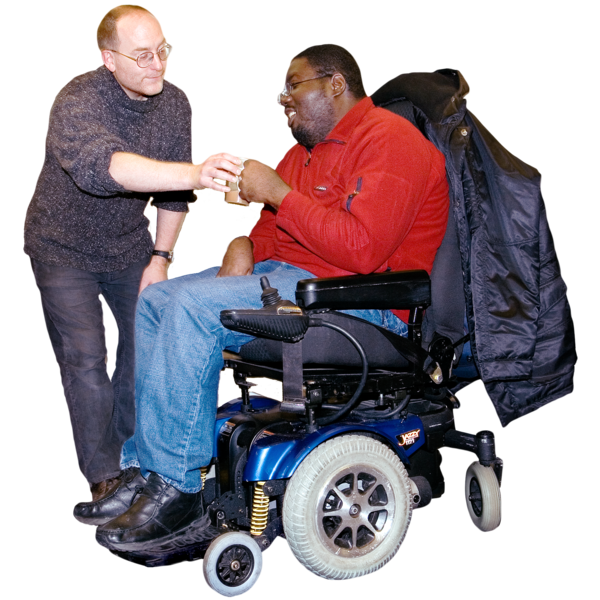This extra funding is to help
social care
 Social care means the services that give care and support to people who need it.
providers “restrict the movement of staff between care homes to stop the spread of the virus” throughout the winter.
Social care means the services that give care and support to people who need it.
providers “restrict the movement of staff between care homes to stop the spread of the virus” throughout the winter.
Responding to the announcement Jackie O’Sullivan, Executive Director of Communications, Advocacy
Advocacy is when you get support to have your say. and Activism
Activism is taking action to make change. Going to a campaign
A campaign is when people work together to try to change something. event with others, writing letters and speaking up are all ways to take action. at the learning disability
A learning disability is to do with the way someone's brain works. It makes it harder for someone to learn, understand or do things. charity Mencap, said:
“This infection control funding for the social care sector is very welcome and much-needed. The social care sector was on its knees before the coronavirus pandemic and increasing support needs and the soaring costs of delivering care means providers are struggling to make ends meet.
“The Government must continue to invest in this life-saving sector. What is needed next is emergency funding in the Spending Review to stabilise the sector and a bold plan for reform alongside long-term funding for a sustainable future – kicking the can down the road to 2021 just isn’t good enough.”
For further information on the Department of Health and Social Care’s announcement visit: www.gov.uk/government/news/more-than-500-million-for-social-care-to-reduce-coronavirus-transmission-over-winter.
-ENDS–
For further information or to arrange interviews, contact Mencap’s media team on:
- media@mencap.org.uk
- 020 7696 5414 (including out of hours).
Notes to editors
Mencap is calling for:
- a clear plan for supporting the whole care market during the pandemic, including services for working-aged disabled adults which currently make up over half of the total social care
budget
 A budget is a plan where you look at how much money you have and how you will spend it.
A budget is a plan where you look at how much money you have and how you will spend it.
- additional funding to meet current demand for support and stabilise the sector
- a road map towards
the Government
 The Government are the people who run the country. The Government decide how much tax people should pay and how things like the National Health Service (NHS) should work.
's plans for social care reform, including a long-term funding solution, fairer access to services and support and workforce reform
The Government are the people who run the country. The Government decide how much tax people should pay and how things like the National Health Service (NHS) should work.
's plans for social care reform, including a long-term funding solution, fairer access to services and support and workforce reform - social care reform and long-term funding must cover a range of services and support that people with a learning disability need, beyond personal care, to enable them to lead independent and fulfilling lives in their
community
 A community is the people and places in an area.
.
A community is the people and places in an area.
.
The social care sector needed an £8 billion investment in social care in England to restore adequate levels of quality and access to what it was a decade ago, according to the Lords Economic Affairs Committee report. While the Association of Directors of Adults Social Services’ latest Budget Survey (PDF) revealed that there is a growing hole in local authorities’ budgets for services supporting people with a learning disability – up to £200m in 2020/21 from £180m in 2019/20.
The coronavirus pandemic has led to local councils in England facing at least a £6.6bn increase in social care costs up to the end of September, according to the Local Government Association and the Association of Directors of Adults Social Services.
About Mencap
There are 1.5 million people with a learning disability in the UK. Mencap works to support people with a learning disability, their families and carers by fighting to change laws, improve services and access to
education
 Education is when you learn things. When you fill in a form to get a job, education means you write where you went to school, college or university.
,
employment
Education is when you learn things. When you fill in a form to get a job, education means you write where you went to school, college or university.
,
employment
 Employment means having a job.
and
leisure
Employment means having a job.
and
leisure
 Leisure is when you have time to do things you enjoy like playing sports or going to the pub.
facilities. Mencap supports thousands of people with a learning disability to live their lives the way they want.
Leisure is when you have time to do things you enjoy like playing sports or going to the pub.
facilities. Mencap supports thousands of people with a learning disability to live their lives the way they want.
Visit www.mencap.org.uk.
For advice and information about learning disability and Mencap services in your area, contact Mencap’s freephone Learning Disability Helpline on 0808 808 1111 (9am to 6pm, Monday-Friday) or email helpline@mencap.org.uk.
What is a learning disability?
- A learning disability is a reduced intellectual ability which can cause problems with everyday tasks – for example shopping and cooking, or travelling to new places – which affects someone for their whole life;
- Learning disability is not a mental illness or a learning difficulty, such as
dyslexia
 Dyslexia is a learning difficulty. People who have dyslexia can find it hard to read, write and spell.
. Very often the term ‘learning difficulty’ is wrongly used interchangeably with ‘learning disability’;
Dyslexia is a learning difficulty. People who have dyslexia can find it hard to read, write and spell.
. Very often the term ‘learning difficulty’ is wrongly used interchangeably with ‘learning disability’; - People with a learning disability can take longer to learn new things and may need support to develop new skills, understand difficult information and engage with other people. The level of support someone needs is different with every individual. For example, someone with a severe learning disability might need much more support with daily tasks than someone with a mild learning disability.